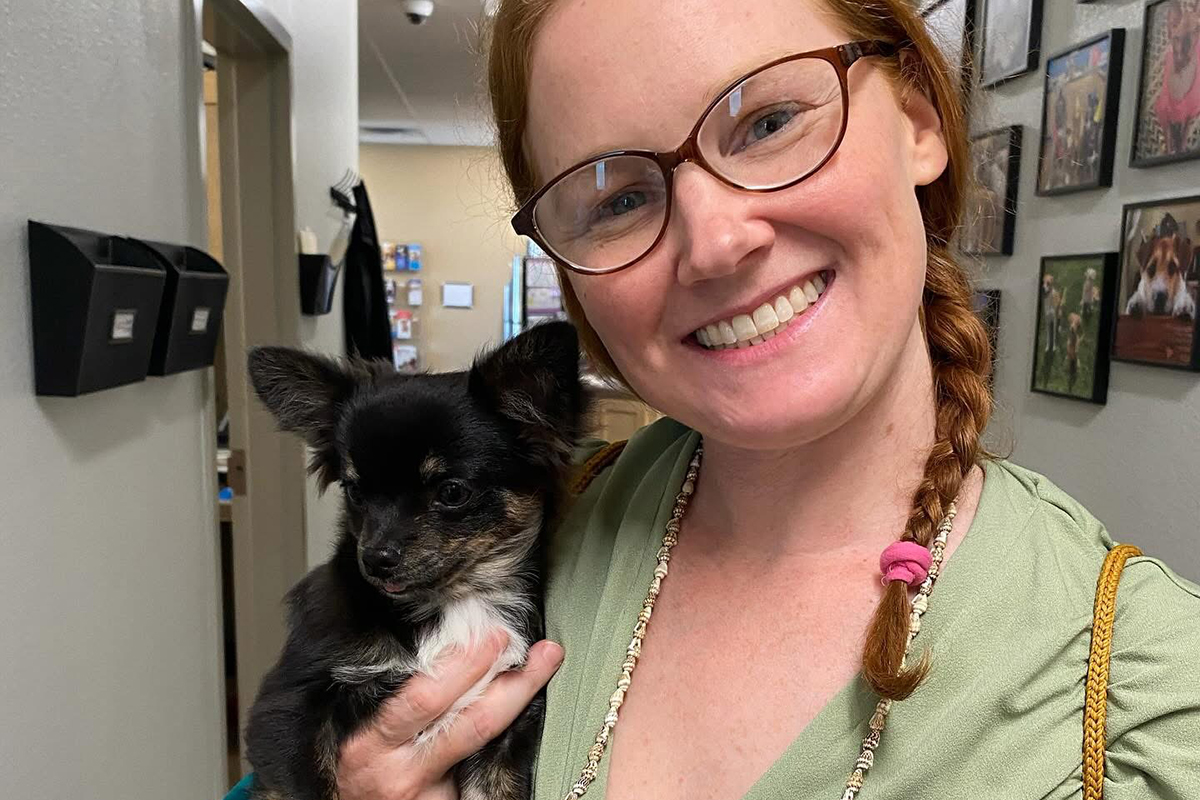
Client Guide: Caring for a New Puppy
Meet Skippy! Our adorable long-haired chihuahua who joined our pack in the summer of 2024. We lovingly named him after one of our favorite children’s stories Skippy Jon Jones. It’s a story about a Siamese cat who thinks he is a chihuahua. Our Skippy is very cute but don’t let that fool you, he is also a naughty little boy chewing on anything that fits in his mouth. He loves to wrestle with our cat, Ron. I don’t even know if it’s possible to train a chihuahua, but you must try, right? Below is some information to help you and your new puppy start off on the right foot.
Essential Tips for New Puppy Owners
Welcoming a new puppy into your home is an exciting and joyful experience, but it also comes with significant responsibilities. Proper care during the early stages of your puppy’s life will set the foundation for a healthy, happy, and well-behaved dog. This guide provides essential tips for new puppy owners to ensure their furry friend receives the best start in life.
Preparing for Your Puppy
Before bringing your puppy home, it’s important to ensure your living space is safe and comfortable for the new arrival.
Supplies Checklist
- Crate: A safe space for your puppy to rest and feel secure.
- Bed: A comfortable place for your puppy to sleep.
- Food and Water Bowls: Preferably stainless steel or ceramic.
- Puppy Food: High-quality food formulated for puppies.
- Collar and Leash: Adjustable collar and a sturdy leash for walks.
- Identification Tag: With your contact information.
- Toys: Safe and appropriate toys for chewing and play.
- Puppy Pads: For house training.
- Grooming Supplies: Brush, shampoo, nail clippers, etc.
Home Preparation
- Puppy-Proofing: Remove or secure any items that could be harmful or that you wouldn’t want to be chewed on, such as electrical cords, small objects, and toxic plants.
- Safe Space: Set up a designated area where your puppy can stay when you are not able to supervise them. This area should be puppy-proofed and contain their crate, bed, and toys.
First Days at Home
The initial days with your new puppy are crucial for building trust and establishing routines.
Introducing Your Puppy to Their New Home
- Calm Welcome: Give your puppy a calm and quiet introduction to their new home. Avoid overwhelming them with too many visitors or loud noises.
- Exploration: Allow your puppy to explore their new surroundings at their own pace. Supervise them closely to ensure their safety.
- Consistent Schedule: Establish a consistent daily routine for feeding, potty breaks, playtime, and sleep to help your puppy feel secure.
House Training
- Frequent Potty Breaks: Take your puppy outside frequently, especially after eating, drinking, playing, and napping.
- Designated Potty Area: Choose a specific spot outside for your puppy to use as their bathroom. This helps them understand where they should go.
- Positive Reinforcement: Praise and reward your puppy with treats and affection immediately after they go potty outside. Avoid punishment for accidents inside the house.
Feeding and Nutrition
Proper nutrition is essential for your puppy’s growth and development.
Choosing the Right Food
- High-Quality Puppy Food: Select a balanced, high-quality puppy food that meets your puppy’s nutritional needs. Consult your veterinarian for recommendations.
- Feeding Schedule: Feed your puppy at regular intervals, typically three to four times a day, depending on their age and breed. Follow the feeding guidelines on the food packaging.
- Fresh Water: Ensure your puppy has access to fresh, clean water at all times.
Treats and Snacks
- Healthy Treats: Offer healthy and appropriate treats in moderation. Treats should not exceed 10% of your puppy’s daily caloric intake.
- Avoid Harmful Foods: Some human foods are toxic to dogs, including chocolate, grapes, raisins, onions, garlic, and certain artificial sweeteners like xylitol.
Socialization and Training
Early socialization and training are vital for raising a well-adjusted and obedient dog.
Socialization
- Exposure to Different Environments: Gradually expose your puppy to various environments, people, animals, and sounds. Positive experiences will help them become well-rounded and confident.
- Puppy Classes: Enroll your puppy in a reputable puppy socialization class to learn basic commands and interact with other puppies.
Basic Training
- Positive Reinforcement: Use positive reinforcement techniques, such as treats and praise, to encourage good behavior and obedience.
- Consistency: Be consistent with commands and routines. Use the same words and gestures for commands to avoid confusing your puppy.
- Short Training Sessions: Keep training sessions short and fun, typically 5-10 minutes, to hold your puppy’s attention.
Health and Veterinary Care
Regular veterinary care is crucial for your puppy’s health and well-being.
Veterinary Visits
- Initial Check-Up: Schedule a veterinary appointment soon after bringing your puppy home for a comprehensive health check-up and vaccinations.
- Vaccinations and Preventatives: Follow your veterinarian’s recommendations for vaccinations, deworming, and flea and tick prevention.
Grooming
- Regular Grooming: Brush your puppy regularly to keep their coat healthy and reduce shedding.
- Bathing: Bathe your puppy as needed using a gentle puppy shampoo.
- Nail Trimming: Trim your puppy’s nails regularly to prevent overgrowth and discomfort.
Exercise and Play
Adequate exercise and mental stimulation are essential for a happy and healthy puppy.
Exercise
- Daily Walks: Take your puppy for daily walks to provide physical exercise and opportunities for socialization.
- Safe Play Areas: Provide safe and enclosed areas for your puppy to play and explore.
Playtime
- Interactive Toys: Offer a variety of interactive toys to keep your puppy mentally stimulated and entertained.
- Play Sessions: Engage in regular play sessions to build a bond with your puppy and expend their energy.
Building a Strong Bond
Forming a strong bond with your puppy is essential for a lifetime of companionship and trust.
Quality Time
- Spend Time Together: Spend quality time with your puppy daily, including playtime, cuddling, and training sessions.
- Positive Interactions: Focus on positive interactions and avoid negative reinforcement or punishment.
Understanding Your Puppy
- Observe Behavior: Learn to understand your puppy’s body language and behavior to recognize their needs and emotions.
- Patience and Consistency: Be patient and consistent in your interactions and training to build trust and a strong bond.
By following these guidelines and providing your new puppy with love, care, and attention, you are setting the stage for a happy and healthy life together. Remember, raising a puppy requires time, dedication, and patience, but the rewards of a loyal and loving companion are immeasurable.

